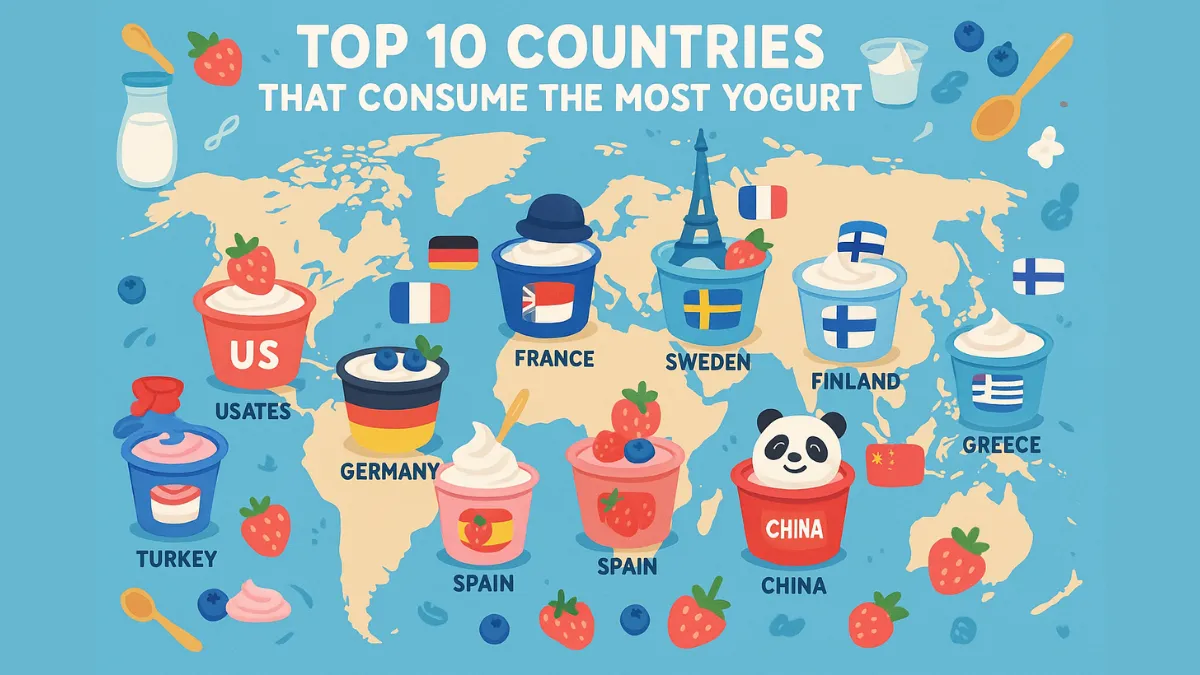Yogurt isn’t just a creamy snack—it’s a global phenomenon. Whether spooned into a breakfast bowl or sipped as a drink, yogurt plays a major role in diets worldwide. From France’s gourmet selections to India’s homemade curd, this fermented favorite has become more than just food—it’s a lifestyle.
Curious to see where your country ranks in yogurt consumption? From health trends to cultural traditions, find out how these top 10 countries incorporate yogurt into daily life—and why this dairy delight continues to grow in popularity everywhere.
France
France tops the list as one of the world’s leading yogurt consumers. The French diet has long celebrated dairy, and yogurt holds a prime spot on the table—from breakfast spreads to post-meal indulgences.
What makes yogurt so popular in France? A focus on digestive health and a preference for local, organic products drive demand. Supermarkets showcase an impressive variety, from natural yogurts to luxurious, fruit-filled options. With a strong dairy farming tradition and a health-conscious culture, yogurt in France is more than a snack—it’s a daily ritual.
Germany
Germans love their dairy, and yogurt is a go-to staple in homes across the country. It’s often eaten with muesli, fresh fruits, or a drizzle of honey, offering both nutrition and taste.
Germany’s yogurt shelves are diverse: think Greek-style, skyr, organic, lactose-free, and probiotic-rich options. Growing interest in gut health and high-protein diets fuels this demand. Whether at school, work, or the gym, yogurt fits perfectly into Germany’s fast-paced, wellness-oriented lifestyle.
Greece
Greek yogurt is a global sensation, and unsurprisingly, it has deep roots in its homeland. In Greece, yogurt is part of the everyday diet and has been for centuries.
The traditional Greek version is known for its thick texture and high protein content. It’s served plain with honey and nuts, paired with meats, or turned into sauces like tzatziki. Yogurt supports the healthy Mediterranean diet, making it both a cultural tradition and a modern wellness choice.
Turkey
Yogurt is an essential part of Turkish cuisine, with origins linked to ancient nomadic tribes. In Turkey, it’s more than food—it’s tradition.
From being a staple in savory dishes to the base of the refreshing drink ayran, yogurt is consumed daily. Turkish yogurt is typically homemade, tangier, and thinner than commercial versions. Its health benefits—especially for digestion and bone health—keep it popular across all generations.
Russia
Russia’s yogurt obsession blends old-world habits with modern health trends. Fermented dairy products like kefir and ryazhenka have long been part of Russian diets.
Today, yogurt is enjoyed in all forms—from drinkable versions to dessert-style cups. It’s common to add honey, fruits, or grains for flavor and nutrition. In cold climates, yogurt provides vital nutrients like calcium and protein, while its probiotic qualities align with the country’s growing interest in functional foods.
United States
Yogurt in the U.S. has evolved from a niche health item to a diet staple. Health-conscious Americans turn to it for its protein, probiotics, and versatility.
Greek yogurt, in particular, dominates the market with its thick texture and high protein count. Beyond breakfast, yogurt appears in smoothies, sauces, and snacks. The demand for dairy-free options—made from almond, coconut, and soy—has also soared, making yogurt more accessible than ever before.
India
Yogurt, or “curd” (dahi), is a daily essential in Indian households. Deeply rooted in tradition, it’s used in everything from lassi and raita to curry bases and desserts.
Known for its cooling effect, yogurt is perfect for India’s warm climate and spicy cuisine. Homemade varieties are especially valued for their purity and probiotic benefits. Recently, urban areas have embraced packaged and flavored yogurts, blending tradition with modern health trends.
China
China’s yogurt consumption has surged over the past two decades. Once limited by widespread lactose intolerance, the country now embraces lactose-free and probiotic-rich yogurts.
Urban youth drive this shift, consuming yogurt drinks and snacks for breakfast or on-the-go. With a rising middle class and increasing focus on wellness, yogurt has become a daily habit. Functional drinks are especially popular for their gut health and bone-strengthening properties.
United Kingdom
In the UK, yogurt fits perfectly into modern, health-driven lifestyles. It’s commonly enjoyed at breakfast, blended into smoothies, or eaten as a quick snack.
British stores offer everything from classic full-fat yogurt to protein-rich Greek and skyr varieties. There’s also a booming market for dairy-free and low-sugar options. Functional yogurts promoting gut health and immunity are especially popular, driven by an increased awareness of wellness and digestive care.
Brazil
Brazil’s warm climate and health-conscious culture make yogurt a popular snack. It’s refreshing, nourishing, and often mixed with local fruits like mango, banana, and papaya.
Brazilian yogurt products range from liquid drinks for kids to protein-rich Greek styles for fitness lovers. The market also features fortified yogurts with added probiotics and vitamins. As accessibility and affordability improve, yogurt continues to be a go-to food for millions across the country.
Why Yogurt Is a Global Staple
From ancient traditions to Instagrammable smoothie bowls, yogurt continues to win hearts and stomachs worldwide. Its health benefits—especially for gut health, immunity, and protein intake—make it a favorite in nearly every culture.
As consumers grow more mindful of what they eat, yogurt’s role in daily diets is only expanding. Whether homemade or store-bought, dairy or plant-based, there’s a version of yogurt for everyone.
FAQs
Q1: Why is yogurt so popular around the world?
Yogurt is loved globally for its creamy texture, rich taste, and health benefits, especially its probiotics, which help support digestion and boost immunity.
Q2: Which country is the biggest consumer of yogurt?
France is often considered one of the top yogurt consumers, thanks to its rich dairy culture and health-conscious population.
Q3: Is Greek yogurt healthier than regular yogurt?
Yes, Greek yogurt typically contains more protein and fewer sugars, making it a popular choice for those seeking a nutritious and filling snack.
Q4: Does eating yogurt every day have health benefits?
Yes! Daily yogurt consumption can improve digestion, strengthen bones, and support gut health, thanks to its probiotics and essential nutrients like calcium and protein.




